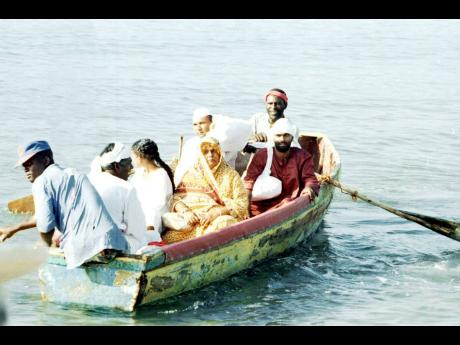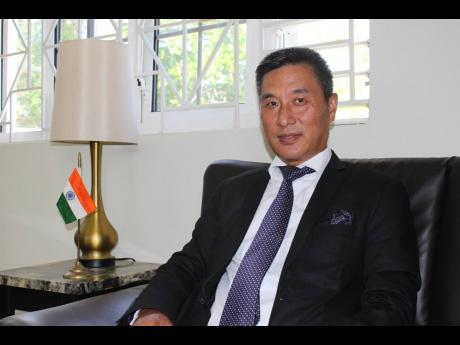Rungsung Masakui | Let’s celebrate our people
Imagine India in the 19th century, a proud civilisation festered with the maggots of colonialism eating into its very spiritual and economic core. So great was the pain that Indians, even with the medieval religious taboo of crossing the high seas looming large in their minds, decided to take the arduous journey to the new world!
This was the genesis of the exodus of over one million indentured labourers from the subcontinent, also called the ‘coolies’. It was the first tranche of ‘brawn drain’ from India that dotted the colonial territories across the new world.
In the search for a better life – forced out by the deteriorating living condition at home and gravitated towards the false promised land – the Indians were headed for great disappointment. The new world was controlled by the same colonial masters who reduced them to tatters at home. The Indians, therefore, were there only to pick up the crumbs. The ‘brawn’ Indians were a like-for-like replacement for the ‘black’ slaves, as it became untenable to justify slavery to the world by the third decade of the 19th century.
The Indians fell on the proverbial barren rocks and among the thistles. Many perished but many more survived. No matter how adverse the conditions were, the spirit of the coolies could not be dampened. Bit by bit, they reconstructed their lives every day.
Adaptive as they are, people of Indian descent have seamlessly amalgamated with the societies, while continuing to keep their links alive with their country of origin. Most of them have been successful in their endeavours, be it in business, professional or public life, while contributing meaningfully to the prosperity and development of their countries of adoption.
The Indians, though present in huge numbers across the Caribbean, have been peace-loving and law-abiding. Never have they been blamed for inciting hatred or practising ethnic distancing. They have immersed themselves in the local culture and have adopted the host country as their motherland. It is for this reason that the former external affairs minister of India, the late Sushma Swaraj, once said, “I have heard three things about Indians living abroad; they are good neighbours, hard-working and law-abiding residents.” That the same values mentioned by the minister were present in the early Indians who came here, as in their descendants and the new arrivals, shows their ubiquity and permanence in the Indian civilisation.
ENRICHED
There is no aspect of life in Jamaica and the Caribbean, I can say at the peril of being corrected, that has not been enriched by the Indians. The Indian influence is visible in the Rastafari and the Revivalist movements in Jamaica. Indians established banana farms, increased sugar cane production, introduced the technology of rice cultivation in Jamaican swamps, and monopolised the cultivation of vegetables and flowers. Fruits such as mango, jamun (wild cherry), coolie baer (plum), kamranga, tulsi (holy basil), neem, and bargad (banyan) were also introduced in Jamaica by Indians. Curried goat, rice, roti, and vegetables are Indian foods that were adopted by the Afro-Jamaicans. The art of making jewellery, particularly from gold, silver and copper, has a huge Indian influence. The Jamaican language has also absorbed a great deal from the language of Indian ‘coolies’. The new Indian immigrants include doctors, engineers, auditors, teachers, entrepreneurs, IT experts etc., who have added immense value to the local economy. Indian community businessmen create jobs by the thousands locally.
In an effort to connect the diaspora more closely with India, the Overseas Citizenship of India (OCI) was introduced in 2005. The OCI card provides lifelong Indian visas for its holders, while also allowing the diaspora to seamlessly engage in business or any other entrepreneurial activity in India. The card has been a great success and there are more than six million OCI card holders worldwide. The conditions for acquiring an OCI card are being simplified continuously.
The Indian government also celebrates the Pravasiya Bhartiya Diwas (Diaspora Day) on January 9, and has been giving the Pravasiya Bhartiya Samman Award since the turn of this century, in recognition of the successes of the Indian diaspora worldwide. Jamaica is fortunate to have two awardees of this prestigious award. The Diaspora Day was celebrated in India earlier this year, and many representatives from the Indian diaspora in Jamaica, including Minister Norman Dunn, travelled to Bhopal to attend the event.
As we near the day of the arrival of the first Indians in Jamaica, I seek to connect more closely with the Indian diaspora here. The High Commission is organising the first Diaspora Day on March 26. It will be an opportunity to listen to the stories of tribulations and successes of the diaspora, the rich heritage they can be proud of, recognise their contributions in bringing Jamaica and India closer, and tell them that India is proud of them.
The Indian diaspora has truly fused the Indian motto of ‘vasudhaiva kutumbakam’ or ‘the world is one family’ with the Jamaican ‘Out of Many, One People’. With them around, I feel that my work of connecting our two peoples, governments and cultures has become a lot easier.
Rungsung Masakui is the high commissioner of India to Jamaica. Send feedback to hcoffice.kingston@mea.gov.in


